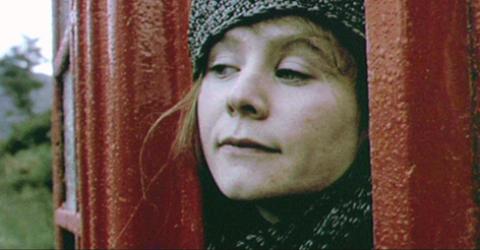
Jim Broadbent as the bitter and cantekerous composer Vyvyan Ayers and Ben Wishaw as the gifted and sensitive Robert Frobisher.
Rating: 6/10
“Our lives are not our own. From womb to tomb, we are bound to others. Past and present. And by each crime, and every kindness, we birth our future.” So Says Sonmi-351 (Doona Bae) a fabricant rebelling against an oppressive corporate future world in Neo Seoul, 2144- and later worshipped as a goddess- in one of the film’s six narrative strands (co-directed evenly by Tom ‘Run Lola Run’ Tykwer and ‘Matrix’ directors the Wachowski’s directing three stories each). This message of transmigrating souls effecting the past, present and future, is emphasised continually throughout the film connecting these interlocking jigsaw-like strands across different time periods and worlds from the Pacific Islands in 1849 to Hawaii in 2321; most pointedly by using the same actors across the stories in different parts.
And so this epic two hours forty-three minutes film takes the brilliantly complex David Mitchell novel, which incorporates a colonial history, a queer tragi-comedy, an investigative thriller, a satiric farce and dystopian and post-apocalyptic sci-fi and attempts to make something more thematically and visually cohesive out of it. As Mitchell says himself about the adaptation “where text slides towards ambiguity, film inclines to specificity” and this ends up with mixed results, where a book can be more subtle in its messages and can take it’s time drawing you in, film only has a limited amount of time to get something across. But it’s a shame they felt the need to emphasise the aspect of love changing character’s destinies and the course of history, and added neat relationships that didn’t exist, as it makes it more Hollywood fare than the pioneering, provocative (largely German) film it’s meant to be. And the sheer amount of references to the transmigrating soul and actions reverberating through time theme does begin to grate. After the fourth or fifth reference we get it already.
The film is still certainly unusual and unlike anything you’ve seen before, although I would argue that films like Babel and Crash use the multi-narrative device to better, more subtle advantage (but then they are based in one contemporary time period). It’s premise means that the film can also be quite bewildering at times; the greyhound speed at which it rushes through the narratives makes you wish it would linger more on one story, which on the plus side does makes it seem shorter than its substantial running time. The film’s premise also means it uses cross-cutting to its best most inventive advantage here to create visual matches between the stories, one example that I particularly admired was a cut from a heavy metal door closing in the 2321 story to a vulnerable Sonmi imprisoned in an unforgiving metal cell.

Tom Hanks as Zachry and Halle Berry as Meronym in the 2321 story, they give strong and memorable performances in this film.
The fact that actors take on multiple parts is also a mixed blessing. Tom Hanks gives one of his best and most entertaining performances as the sinister and avaricious Dr. Goose in the 1849 story, and is pretty good at playing the fearful and conflicted Zachary in the 2321 story, but fails to really convince as a violent criminal Irish writer in the contemporary story. While Doona-Bae (in her first English language role, for which she learnt English from scratch) gives a moving performance as Sonmi depicting well her unfolding sense of humanity and injustice, but no matter how much make-up you put on her she still looks Asian when playing Westerners and struggles to do accents. Likewise Hugh Grant gives a career best performance as villainous characters such as the racist, arrogant Rev Giles Horrox in the 1849 story and as the smarmy, misogynist nuclear plant owner Lloyd Hooks in the 1973 story, but cannot be taken seriously as a primitive cannibalistic chief in the 2321 story. At the same time Hugo Weaving as a heartless female nurse works not because he convinces as a woman, but because he is funny as a woman in what is meant to be the film’s most comic story.
But it really is the performances most of all which makes this film worth watching, aside from all the visual trickery and its monumental production design- it’s vision of a Blade Runner-like Neo-Seoul is particularly impressive (German technical expertise is certainly showcased in this film). Ben Whishaw perfectly conveys the frustrations of a desperate, sensitive and destitute gay composer who is manipulated by his employer, a once-famous composer (Jim Broadbent, equally good here as a comically grouchy and bitter old man) in the 1936 story, he also makes a startlingly good woman in the contemporary farce, unrecognisably so. While David Gyasi gives a dignified performance as a desperate and resourceful escaped slave in the 1849 story, and Halle Berry reminds us how good she can be as a brave and determined investigative journalist in the 1973 story.
It’s certainly one hell of a ride just don’t expect it to be as clever as it thinks it is.
1 Comment
Comments RSS TrackBack Identifier URI

Reblogged this on Cinematic Adventures and commented:
la